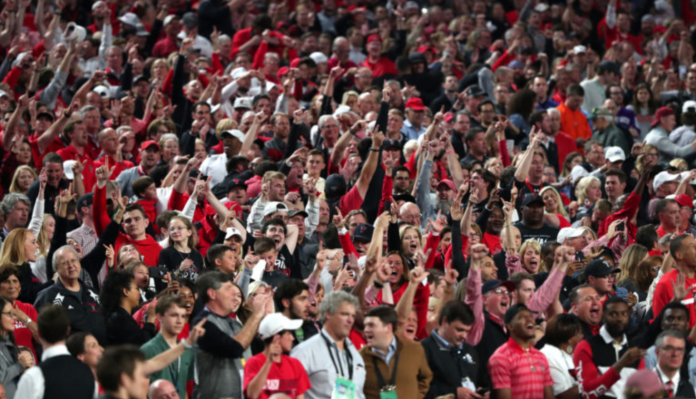Lubbock fans watching tonight’s NCAA Men’s National Championship basketball game between the University of Virginia and Texas Tech will have numerous ways to celebrate if the latter wins, but riding Lime-branded electric scooters will not be among them.
Six months after Lime rolled out its motorized vehicles in Lubbock — the city in Northwest Texas that Texas Tech calls home — Lime has pulled them from city streets for today and tonight, because overzealous fans who gathered near the school after its win over Michigan State on Saturday night reportedly began tearing down street signs, throwing glass bottles in the air, tipping over at least one car and, yes, setting scooters on fire.
It was an embarrassment for the school, which proudly calls Chiefs quarterback Patrick Mahomes an alum (he was at Saturday’s game). It was an embarrassment for the broader city, too, with Lubbock police quickly issuing a statement that read: “After the Texas Tech Men’s Basketball team defeated Michigan State in a NCAA Championship Final Four game, hundreds of fans gathered on Broadway, near University. The crowd engaged in extremely dangerous, and disappointing, behavior including vandalizing property. We are proud, and excited, for Texas Tech, but behavior like this will not be tolerated. We want Red Raider fans to support the team and celebrate lawfully and responsibly. We are on the national stage so make Lubbock proud.”
Still, Lime clearly didn’t want to take any chances with its scooters, which reportedly cost anywhere from $100 to $500 at retail. Neither does it want someone getting killed on one before or after the big game tonight, which takes place in Minneapolis. Said Lime in a statement sent to TechCrunch a bit ago, “While we too are excited and proud of Texas Tech’s victory and tournament run, we also share the city of Lubbock’s concerns for public safety. In anticipation of tonight’s big game, we have pulled our fleet from the streets before it commences, and will re-deploy scooters after activities subside early Tuesday morning.”
Lime didn’t answer questions today, including how many scooters are currently in Lubbock on a daily basis, whether the company consulted first with city officials and if this is the first decision of its kind. Rival Bird has also not responded to related questions. But Thom Rickert, a Dallas-based risk specialist focused on both traditional and emerging trends that impact public entities — from scooters to drones to automated vehicles — says he is not aware of any scooter company previously yanking its fleet out of crowd-control concerns and that it may well become the norm.
It should, in his view. For one thing, Rickert, like others of us, has seen scooters abused in settings involving large numbers of people and alcohol. He points to Dallas’s Saint Patrick’s Day parade, which attracted more than 100,000 people this year. “I saw some pretty bad behavior” as it relates to scooters, Rickert recounts with a stifled laugh.
Rickert, who works for the specialty insurance company Argo Group, further notes that there’s plenty of data that’s available to Lime and anyone else who wants a better understanding of incident patterns, including when and where and under what conditions vandalism tends to take place. It’s the same kind of data that informs a lot of things to which Americans are accustomed, including parks that close at sundown, and pools rendered inaccessible after Labor Day. “Communities make certain decisions about facilities and equipment based on risk assessment to lessen the impact of certain behaviors,” he says.
It’s conceivable, in fact, that armed with such information, scooter companies may ultimately have no choice but to sweep their products off city streets in advance of certain happenings, that with knowledge comes greater liability. Only time will tell, but don’t be surprised. It would be a pretty natural evolution for the companies. Most already have their wares collected at sundown owing to similar safety, liability and expense-related concerns — because, in short, people sometimes act dumb.
